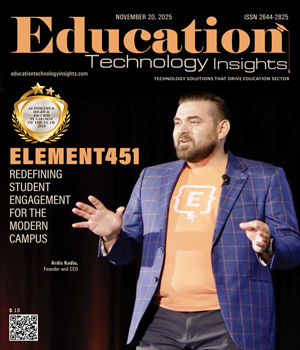THANK YOU FOR SUBSCRIBING
Be first to read the latest tech news, Industry Leader's Insights, and CIO interviews of medium and large enterprises exclusively from Education Technology Insights
Can Leaders Develop Innovation, Commitment and Creativeness Through Development Programs?
Claude Toland, Director of Education at Universal Technical Institute
 Claude Toland, Director of Education at Universal Technical Institute
Claude Toland, Director of Education at Universal Technical InstituteAs we think of how fast organizational change is taking place and whether or not we can react in time to save our organizations, we must think of changing how we react or lead during these times. For example, Doyle (2002) stated that the new working practices brought on by change, requires leaders to be more innovative and creative. We are reminded, leadership is not a title but a behavior that requires innovation, creativity, discipline, the ability to influence, and commitment.
Knowing this, the question arises, can we develop leaders to be innovative and creative or are these natural skills and talents that leaders develop from within? One thing we know, what worked yesterday, may not work today. In addition to leaders being quick to change and being innovative, the leader must empower employees to be innovative and allow them to become more involved in managing the change process. Again, the question arises, what does it take to empower employees to be innovative? What development will a leader need to become innovative then use those skills to develop employees to have the same skills?
Since change is happening quickly, we may not be able to say one leadership innovation strategy is the optimum to address organizational issues. Gill (2002) stated that change is often unstructured, yet it requires management. Gill also stated that change requires more than management, it requires a committed leader to see the change through to completion. Can a leader become committed through leadership development programs or is this a natural gift?
"In order for organizations to succeed in the 21st century, organizations need to cultivate and develop 21st Century Leaders at all levels, including areas of innovation, creativeness, commitment, and the ability to transfer skills to employees"
Gill (2002) stated that change is a journey, and it requires a leader who can take the organization from the current state to the desired state, and often the situation will identify the leader. This person will have vision, values, ability to develop and implement the necessary strategy, and the ability to motivate and inspire.
Knowing that we need to provide leadership development, we ask, what is the cost of developing a leader with the skills we need? On the other hand, what is the cost to our organization if we do not develop our leaders? We want our organizational leaders to have the skills and talent required to move our organization through change. Yemiscigil, Born and Ling (2023) stated we must cultivate, “…the broad capabilities, such as self-awareness or resilience…” and these “…are necessary to adapt to dynamic, evolving challenges.” According to Yemiscigil, Born and Ling (2023) that cost for leadership development across all organizations is about $60 billion a year. They go on to state that, “Without effective implementation, these programs fail to pay off. But when done right, they can help leaders of today and the future grow, engage and flourish.” Ultimately, answering our questions about leadership development and is the cost of $60 billion a year worth the investment.
In order for organizations to succeed in the 21st century, organizations need to cultivate and develop 21st Century Leaders at all levels, including areas of innovation, creativeness, commitment, and the ability to transfer skills to employees. In addition, an important aspect of ensuring success is to know if organizational leaders are effective in these areas. In order for this to happen, processes must be implemented to evaluate leadership outcomes. By evaluating the leadership outcomes using methods such as 360-leadership surveys and employee surveys, organizations and their leaders can both benchmark where they are today and guide their direction of where they want to be tomorrow and measure success of the $60 billion investment.
Read Also
The Power of International Education Collaborations
Designing Schools around Student Voice
What is Edtech Leadership in 2026
Designing Academic Leadership Around Real Lives
Why Student Success Begins with Being Seen
Inclusion is not a Department: The Systemic Ripple Effect of Belonging

I agree We use cookies on this website to enhance your user experience. By clicking any link on this page you are giving your consent for us to set cookies. More info
























